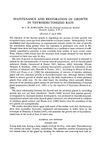 47 citations,
January 2001 in “Journal of Investigative Dermatology”
47 citations,
January 2001 in “Journal of Investigative Dermatology” High testosterone to epitestosterone ratio in hair could predict male-pattern baldness.
8 citations,
January 2019 in “The journal of investigative dermatology/Journal of investigative dermatology” Growth hormone is important for regulating human hair growth.
 5 citations,
October 2021 in “Signal Transduction and Targeted Therapy”
5 citations,
October 2021 in “Signal Transduction and Targeted Therapy” Stress hormone corticosterone suppresses hair growth by affecting stem cell activity and Gas6 protein expression.
 66 citations,
January 2000 in “Hormone Research in Paediatrics”
66 citations,
January 2000 in “Hormone Research in Paediatrics” Androgens can both promote and prevent hair growth due to differences in gene expression in hair follicles.
 January 2025 in “Applied Sciences”
January 2025 in “Applied Sciences” Sulforaphane from broccoli may help treat certain cancers, hormone issues, and hair loss.
 15 citations,
October 2014 in “Hormone Molecular Biology and Clinical Investigation”
15 citations,
October 2014 in “Hormone Molecular Biology and Clinical Investigation” Some hair loss and prostate drugs might increase the risk of diabetes and heart disease.
 1 citations,
March 2021 in “Skin health and disease”
1 citations,
March 2021 in “Skin health and disease” Better hair loss models needed for research.
 49 citations,
May 2018 in “Endocrine”
49 citations,
May 2018 in “Endocrine” Women with regular menstrual cycles and PCOS have linked kisspeptin and LH hormone patterns, unlike those with irregular cycles.
 October 2022 in “Frontiers in Endocrinology”
October 2022 in “Frontiers in Endocrinology” New tools show that in fish, NPY increases feeding and somatostatin decreases it.
 January 2008 in “US endocrinology”
January 2008 in “US endocrinology” Mutations in the glucocorticoid receptor gene cause reduced sensitivity to glucocorticoids and may lead to poor response to treatment.
 14 citations,
September 2018 in “The journal of allergy and clinical immunology/Journal of allergy and clinical immunology/The journal of allergy and clinical immunology”
14 citations,
September 2018 in “The journal of allergy and clinical immunology/Journal of allergy and clinical immunology/The journal of allergy and clinical immunology” A boy's growth and immune problems were caused by a new mutation in the STAT5B gene.
 24 citations,
July 2011 in “PubMed”
24 citations,
July 2011 in “PubMed” Thyroid hormones affect skin texture, hair and nail growth, and can cause skin diseases related to thyroid problems.
198 citations,
January 1998 in “Dermatology” The human sebocyte culture model has improved understanding of oily skin and acne, and how they can be treated.
 97 citations,
March 2009 in “Dermato-endocrinology”
97 citations,
March 2009 in “Dermato-endocrinology” Hormones significantly affect hair and oil gland function in the skin, and more research is needed on skin-related hormone disorders.
 3 citations,
October 2003 in “Annals of Oncology”
3 citations,
October 2003 in “Annals of Oncology” A woman with low thyroid function did not lose her hair during chemotherapy, possibly because her hair follicles were less affected by the treatment.
 8 citations,
March 1942 in “Journal of Endocrinology”
8 citations,
March 1942 in “Journal of Endocrinology” Thyroid hormone treatments help thyroidectomized rats grow normally.
84 citations,
December 2008 in “Developmental biology” Retinoic acid-binding proteins in skin are regulated by β-catenin and Notch signalling.
 January 2018 in “bioRxiv (Cold Spring Harbor Laboratory)”
January 2018 in “bioRxiv (Cold Spring Harbor Laboratory)” Researchers found key regions in the mouse hairless gene that control its activity in skin and brain cells, affecting hair follicle function.
450 citations,
January 2005 in “The journal of investigative dermatology/Journal of investigative dermatology” Hair color is determined by melanin produced and transferred in hair follicles.
109 citations,
February 2018 in “CB/Current biology” ERULUS controls root hair growth by regulating cell wall composition and pectin activity.
 19 citations,
October 2017 in “The FASEB Journal”
19 citations,
October 2017 in “The FASEB Journal” Male hormones cause different growth in identical human hair follicles due to their unique epigenetic characteristics.
7 citations,
June 1994 in “International journal of biochemistry/International Journal of Biochemistry” The document discusses various skin disorders and new therapeutic approaches.
 12 citations,
May 2010 in “PubMed”
12 citations,
May 2010 in “PubMed” No definitive link between finasteride and male breast cancer, but further research is needed.
 11 citations,
July 2001 in “APMIS. Acta pathologica, microbiologica et immunologica Scandinavica./APMIS”
11 citations,
July 2001 in “APMIS. Acta pathologica, microbiologica et immunologica Scandinavica./APMIS” Estrogens are key for bone growth spurts in both boys and girls and affect growth into adulthood.
May 2019 in “Clinica chimica acta” The study developed methods to measure biomarkers in mice and found differences in hormone levels linked to gut microbiota diversity and stress response.
 24 citations,
October 2016 in “Oncotarget”
24 citations,
October 2016 in “Oncotarget” Finasteride has a higher risk of reproductive side effects than minoxidil.
 85 citations,
July 2002 in “Pigment Cell Research”
85 citations,
July 2002 in “Pigment Cell Research” The article concludes that while we understand a lot about how melanocytes age and how this can prevent cancer, there are still unanswered questions about certain pathways and genes involved.
 18 citations,
July 2020 in “Basic and Clinical Andrology”
18 citations,
July 2020 in “Basic and Clinical Andrology” Wait 3 months after COVID-19 before trying assisted reproduction and further research is needed on COVID-19's effects on male hormones and fertility.
 October 2022 in “Frontiers in Cell and Developmental Biology”
October 2022 in “Frontiers in Cell and Developmental Biology” Aging skin is affected by inflammation, reduced stem cell function, and slower wound healing.
 December 2022 in “Cureus”
December 2022 in “Cureus” Hormones significantly influence hair growth, with conditions like hirsutism and patterned hair loss linked to hormone levels; more research is needed for full understanding.























